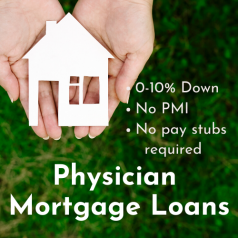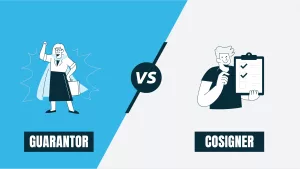Guide to Physician Mortgage Loans (2024)
Go Back To Previous PageAlthough doctors typically have stable careers and high earning potential, many new doctors struggle to qualify for traditional mortgages due to their high student debt and high income-to-debt ratios. To address this, mortgage lenders have created specialized physician mortgage loans to help physicians buy a home. This loan type features many advantages.
What Is a Physician Mortgage Loan?
A physician mortgage loan, also known as a doctor loan, is a specialized mortgage product designed to meet the unique financial needs of physicians and other medical professionals.
These loans, provided by most lenders, typically offer favorable terms and conditions for purchasing a primary residence.
loans, provided by most lenders, typically offer favorable terms and conditions for purchasing a primary residence.
They accommodate doctors’ financial situations, such as high student loan debt and relatively low starting salaries compared to future earning potential.
To apply for this type of loan, you must submit proof of your medical degree and a contract from the hospital or other institution you work for, indicating your present or future salary. You’ll also need a good credit score and must actively pay your student loans.
Therefore, you won’t have difficulty qualifying for the loan amount if everything checks out.
Physician Mortgage Loans Advantages
1. Less Money Down
One significant benefit of a physician mortgage loan is that you can often qualify for a home with a low down payment or even no money down.
This can be a great help for young doctors and other professionals who desire the stability of homeownership but have limited savings because of student loan debt.
2. No PMI
One significant benefit of a physician mortgage loan is that private mortgage insurance (PMI) is not required, even with a down payment of less than 20%. Therefore, you don’t need to be concerned about adding this extra fee to your monthly mortgage payment.
3. Higher Loan Limits
Physicians’ loans often offer higher loan limits than conventional ones because they consider your future earning potential, not just what you currently make.
4. Easier Qualification
The qualification process for a physician’s loan is often easier than a conventional loan, as long as you can provide the required documents.
Doctors and high-level professionals are statistically less likely to default on their mortgages; therefore, the underwriting process is less stringent.
Physician Mortgage Loans Disadvantages
1. Easy to Get in Over Your Head
Just because you are eligible for a loan doesn’t mean taking one is a good idea. Obtaining a mortgage can put you in a challenging financial situation if you still have a significant amount of student loan debt and other expenses. If you’re not fully prepared to own a home, renting for a few years might be wise.
2. Terms May Be Unfavorable
Remember that not all physician loans are advantageous for the borrower. Often, they come with variable rates, meaning the rate may increase at some point. Additionally, some lenders only provide physician loans for purchasing single-family homes, which could be problematic if you want to buy a condo.
Carefully read all the terms and conditions before agreeing to anything.
3. Interest Rates May be Higher
Physicians’ loans usually have higher interest rates than conventional mortgages. Depending on your credit score and other factors, the rate may be 0.25 to 0.5% higher. However, the bank will require some incentive to take on the added risk.
Physician Mortgage Loan Alternatives
1. FHA Loans
FHA loans are an alternative if you don’t have enough money for a complete 20% down payment. With an FHA loan, you can put down as little as 3.5% and have a credit score as low as 550. However, you may be required to pay a higher interest rate and a private mortgage insurance (PMI) premium.
This option is available if you don’t meet the credit requirements for a physician’s loan.
2. VA Loans
VA loans enable individuals to secure a mortgage with 0% down, even with a credit score as low as 580. However, these loans are exclusively available to retired or active-duty military personnel. Therefore, eligibility for a VA loan requires prior service in the armed forces.
3. Save for a 20% Down Payment
Consider renting after school and saving for a 20% down payment. Although you won’t receive the same debt forgiveness as a physician’s loan, you may be approved for a better interest rate if you pay your debts and excel in your career.
4. Get a Conventional Loan With PMI
You can also obtain a traditional mortgage with a down payment of less than 20% and pay for private mortgage insurance. However, this could become expensive if you are still repaying student loans and are now taking on a mortgage payment along with insurance premiums.
If you believe you can manage it, this is a prudent method to avoid a variable interest rate.
5. Refinance From an Existing Physician’s Loan
The final option is to begin with a physician’s loan right after graduating and refinance later. This way, you can purchase a home with less money saved and establish yourself before transitioning to a fixed-rate loan.
Are Physician Mortgage Loans Worth It?
Physician mortgage loans can be a good choice if you can secure favorable terms, such as a low down payment and no private mortgage insurance (PMI). However, these loans may not be the best option for everyone, particularly if you qualify for a conventional loan with a lower interest rate.
Thoroughly assess your financial situation and carefully review the terms of available loans before determining if a physician mortgage loan is the right choice for you.


